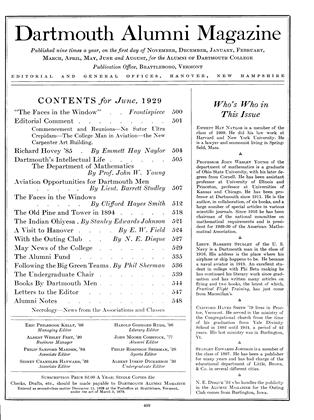D. B. O'CONNOR '12
Mr. O'Connor, who is vice-president of the Alumni Council and chairman of the Executive Committee of his class, has also been active in the work of rating applicants for Dartmouth by means of alumni committees. His field has been the very difficult one of New York City and since the Alumni Council accepted the responsibility for getting the rating work done, that is, in the last four years, his committees have received 1264 blanks, of which 1076 have been completed with the requested information and all but 13 returned to the College. This is an exceptional record when the difficulty of the work in a center like New York is considered.
Twenty-six committees of three men each have been working and Mr. O'Connor described the considerations which prevailed in the appointment of these committees. The necessity of availability of the members is obvious. They must be representative of the College and have a certain degree of permanency. It is evident that while the committees are looking the applicants over the applicants are doing the same for the committees and the one hundred and fifty alumni who have been engaged in the work in New York have in this way served as representative Dartmouth men. A further requisite on the part of the committee is capacity for quick work since the blanks which are received on December first are usually completed by the middle of January. Finally, experience has shown that the alumni on these committees must be absolutely protected so far as their reports are concerned and from attempted influence by alumni. It is necessary that all men engaged in this work must not only realize its importance in the Selective Process but must also appreciate that it is but one factor in the final selection of an applicant and in the case of rejection of men who have been highly recommended by alumni committees it is important that the sense of proportion of the various elements in the process be maintained.
With the constant improvement of quality in the men who are being recommended by the secondary schools it becomes apparent that the situation will soon be such that there can be no apparent or tangible reason for rejection since the average quality is so high.
 View Full Issue
View Full Issue
More From This Issue
-
 Article
ArticleThe Faces in the Windows
June 1929 By Clifford Hayes Smith '79 -
 Article
ArticleAviation Opportunities for Dartmouth Men
June 1929 By Lieut.Barrett Studley,U.S.Navy -
 Class Notes
Class NotesCLASS of 1923
June 1929 By Truman T.Metzel -
 Lettter from the Editor
Lettter from the EditorEditorial Comment
June 1929 -
 Article
ArticleA Visit to Hanover
June 1929 By E.W.Field -
 Class Notes
Class NotesCLASS of 1898
June 1929 By H.Philip Patey







